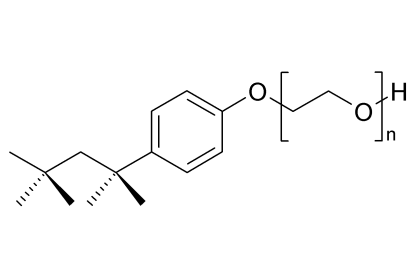產品櫥窗
-
Triton X-100
|
產品型號:101-9002-93-1 商品規格: |
 |
Nonionic detergent. Synonym: Polyethylene glycol tert-octylphenyl ether
(C14H22O(C2H4O)n
M.W.: 647
Appearance: Liquid, clear to slightly hazy, colorless to light yellow
Triton X-100 is a nonionic detergent, 100% active ingredient, which is often used in biochemical applications to solubilize proteins. Triton X-100 has no antimicrobial properties. It is considered a comparatively mild non-denaturing detergent and is reported in numerous references. It does absorb in the ultraviolet region of the spectrum, so it can interfere with protein quantitation by absorption at A280nm. A number of polymeric resins have been used to remove X-100 from solution, including Amberlite hydrophobic XAD resins and Rezorian A161 cartridges. For lysing cells, typically about 0.1% X-100 solution in water will be sufficient, and even up to 0.5% concentrations will usually not harm most enzymes being isolated. Many enzymes remain active in the presence of X-100; for example, Proteinase K, remains active in 1% (w/w) solutions of X-100. Triton X-100 can be detected in the parts per million range by spectrophotometric measurement of the concentration of a Triton-ammonium-cobalt-thiocyanate complex. Interfering substances in this assay have been discussed.
M.W.: 647
Appearance: Liquid, clear to slightly hazy, colorless to light yellow
Triton X-100 is a nonionic detergent, 100% active ingredient, which is often used in biochemical applications to solubilize proteins. Triton X-100 has no antimicrobial properties. It is considered a comparatively mild non-denaturing detergent and is reported in numerous references. It does absorb in the ultraviolet region of the spectrum, so it can interfere with protein quantitation by absorption at A280nm. A number of polymeric resins have been used to remove X-100 from solution, including Amberlite hydrophobic XAD resins and Rezorian A161 cartridges. For lysing cells, typically about 0.1% X-100 solution in water will be sufficient, and even up to 0.5% concentrations will usually not harm most enzymes being isolated. Many enzymes remain active in the presence of X-100; for example, Proteinase K, remains active in 1% (w/w) solutions of X-100. Triton X-100 can be detected in the parts per million range by spectrophotometric measurement of the concentration of a Triton-ammonium-cobalt-thiocyanate complex. Interfering substances in this assay have been discussed.
Store at Room Temperature.


